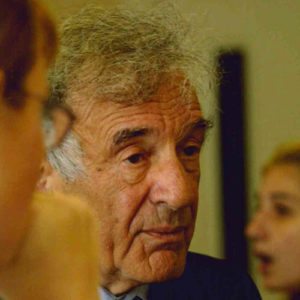For 23 years, it was my privilege and joy to introduce Elie Wiesel each spring to the College’s entering class in Fox Hall. Over the years, it became a source of secret amusement to the two of us because I would invariably describe him as a “prophet,” and he would invariably begin addressing the students by rejecting that term. “Prophets come to bad ends,” he would say and go on to explain that he was a “witness.” I think the students enjoyed hearing the dean called down by Dr. Wiesel, and we both knew that this good-natured exchange gave us both a chance to say something important about his unique and powerful role in history.
The fact is, Elie Wiesel was an eloquent witness to both the heights and depths of which human beings are capable, and also a prophet judging the past and expressing hope for the future. In my introductions, I put it this way:
When we think of prophets, we tend to think of those who speak loudly, at length and in rolling cadences of denunciation—the voices of earthquake, wind and fire. But the voice of this prophet is generally quiet—one strains a bit to hear it. But this is the voice that calls out of the stillness—out of the Night—the one voice you do not want to miss: the voice of Elie Wiesel.
—Lloyd W. Chapin, Ph.D. (P ’94, GP ’08)
Vice President and Dean of Faculty Emeritus and
Professor Emeritus of Philosophy and Religion, Eckerd College


